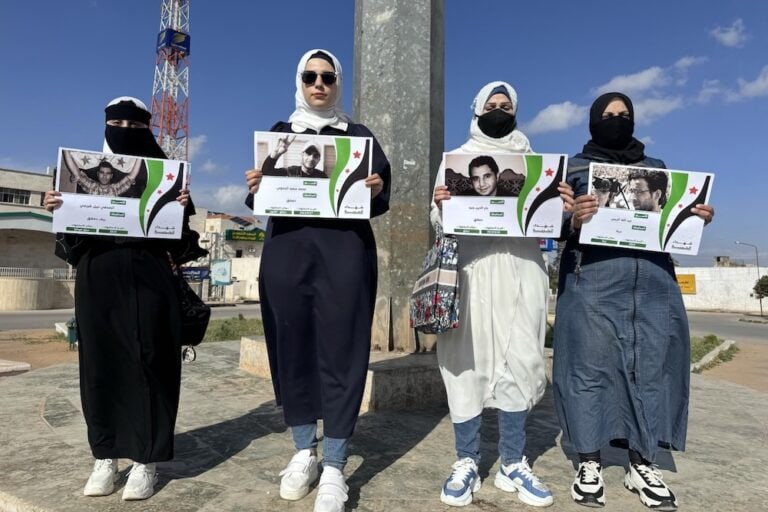"The regime treats bloggers as enemies and fears their ability to use the Internet to exchange information and organise protests," RSF said.
(RSF/IFEX) – Reporters Without Borders condemns the arrests of more bloggers in recent weeks in Syria, where the regime treats netizens and bloggers as enemies and fears their ability to use the Internet to exchange information and, potentially, organise protests.
One of the latest to be arrested is Ahmad Hadifa, who is known by the blog name of Ahmad Abu Al-Kheir. Military security officials detained him in the northwestern city of Baniyas on the morning of 20 February 2011. The next day, they confiscated his computer from his home. He was reportedly due to be interrogated by military intelligence in Damascus on 24 February.
A journalism student at the Fatah Al-Islam Institute in Damascus, Hadifa, 28, had appealed on his blog ( http://www.ahmadblogs.net ) for support for recently detained bloggers and for political prisoners in the Golan Heights (a region that Israel occupied in 1967 and annexed in 1981). He had also posted demands to the Syrian authorities, comments about the recent uprisings in Tunisia and Egypt, and advice on how to circumvent online censorship.
Kamal Hussein Sheikho, a blogger and activist who has been held since 23 June 2010, has begun a hunger strike in protest against conditions in Adra prison. His trial is due to begin on 7 March, just a few weeks after Tal Al-Mallouhi was given a five-year jail sentence on a spying charge. Aged 20, Mallouhi is the world’s youngest imprisoned blogger.
Reporters Without Borders calls on the authorities to provide precise information about three other bloggers of whom there has been no news since their arrests. They are Firaz Akram Mahmoud, arrested arbitrarily in an Internet café in Homs on 5 February 2011; Ahmed Ben Farhan Al-Alawi, arrested by security agents on 26 October 2010; and Ahmed Ben Abdelhalim Aboush, held since 20 July 2010. Aboush was previously detained for six years, until released under a presidential pardon on 2 November 2005.
Reporters Without Borders has also learned that an Internet user was arrested after posting a video on YouTube of a demonstration on 17 February in the Damascus neighbourhood of Harika in which a young man was beaten by police. It shows hundreds of people shouting anti-police slogans and interior minister Said Sammour addressing the crowd.
A military criminal court has postponed issuing a verdict in the case of the journalist and writer Ali Al-Abdallah until 13 March. Arrested on 17 December 2007 for signing the Damascus Declaration, Abdallah should have been released on 16 June 2010 on completing a 30-month jail sentence. But the authorities kept him in detention on the grounds that he was the author of an article posted online on 23 August 2009, while he was in prison, that criticised Iran’s Wilayat al-Faqih doctrine, which gives the country’s clerics absolute power over political affairs.
He was initially charged with “publishing false information with the aim of harming the state” (under article 286 of the criminal code) and “intending to harm Syria’s relations with another state” (under article 276 of the criminal code). But a Damascus military court brought new charges against him that were confirmed by the country’s highest appeal court on 1 December 2010, and he is now facing a new jail sentence. The case is particularly worrying as it shows that it is dangerous for journalists to criticise not only the government but also its allies.
Another journalist, Maan Aqil, is meanwhile still banned from travelling abroad and is being subjected to constant harassment.
Syria is one of the countries on the “Enemies of the Internet” list that Reporters Without Borders updates every year. A new version will be issued on 12 March, World Day Against Cyber Censorship.


